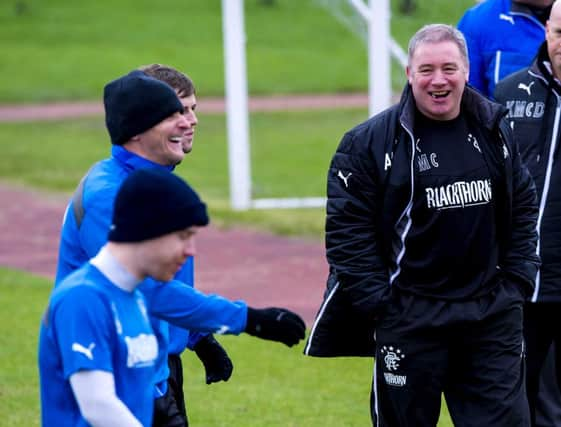Gordon Durie credits McCoist for Rangers morale


The under-20s coach at Ibrox, Durie believes that in the circumstances it would be understandable were McCoist to be downhearted at times. Instead, he believes the boss has provided exemplary leadership.
“I think what the manager has done in the last two years has been fantastic,” Durie said yesterday of his former team-mate. “He has kept the place ticking over. He has had a smile on his face most of the time. He has kept everyone at the training ground and at the club as upbeat as he can. I think he has done a great job. Everyone looks to the manager for advice. I can only say he has been great. It would be easy for him to come in here with a glum face and be down – I think you can see why he would come in here in the last few years feeling like that.
Advertisement
Hide AdAdvertisement
Hide Ad“But he doesn’t. Coisty being Coisty, he is as upbeat as he can be and that rubs off on everyone else. There is a wee bit of banter. We try and keep it as upbeat as we can despite the things that have happened off the park and concentrate on the football side.”
A Rangers player for seven years from 1993, Durie returned to Ibrox last year to work with the reserves as well as the under-20s in close collaboration with youth coach Billy Kirkwood. Before then he had been on an enforced break from football on health grounds, having resigned as manager of East Fife in late 2012 after a virus caused him to collapse in the dressing-room.
Having initially taken over at New Bayview as a caretaker manager following the resignation of John Robertson, Durie later accepted the post on a permanent basis. He explained that, while pleased to have returned to football and to good health, he had no wishes to resume his managerial career, and did not envy the pressure under which McCoist had to work.
“If I’m honest with you I didn’t really want to be a manager,” the 48-year-old said. “The East Fife thing just kind of fell in my lap sort of thing, and I thought: ‘Och, I’ll give it a wee go’.
“But long term, no, I wouldn’t look to be a manager. I’m delighted to be doing what I’m doing.
“I only did it part-time at East Fife so I can only imagine what the manager goes through here. It was hard enough for me pressure-wise at East Fife. I don’t think that was everything that was the problem, but we all know what is entailed being a manager and it is not easy.
“I was glad to get back. I had my problems at East Fife so I was out of the game for a year. The manager gave me a phone call last December and told me he thought there might be something here. I was delighted to be back involved in football first and foremost. If I was going to pick somewhere to be involved it would be here for me.
“I was out for a year and a bit. It wasn’t great. I could tell you about every daytime television programme under the sun! It was tough. In the first six months I didn’t really go anywhere. Once I got a wee chink of light that there might be something here that certainly perked me up. Touch wood, health-wise I have been great.”
Advertisement
Hide AdAdvertisement
Hide AdAlthough neither Durie nor any of his coaching colleagues below the first team face anything like the pressure that is heaped on McCoist day in day out, their posts carry significant responsibility. Besides the everyday duties of coaching the under-20s, they know that they could save the club millions in transfer fees if they help their players to make a smooth transition into the first team.
Last week McCoist suggested Rangers could need £30 million before they could be back competing with Celtic at the top of the Premiership. Durie knows that figure is hard to come by, and that because the production of homegrown talent could save millions, youth development is of vital importance.
“I think it is for any club, and especially us at this time,” he added. “We don’t have the money we used to have, so it is important we have youth players coming through.
“If I had a crystal ball, it would be good to see if all these boys progress. That’s what we’re looking for and with us not having the money we used to have to spend, we’ve had about six young boys involved [in the first team], which is promising.”